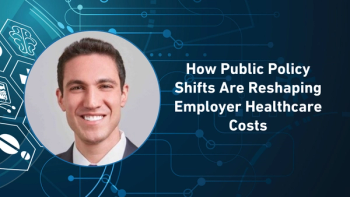
Deepening Access Gaps
In the first part of his Pharma Commerce video interview, Marschall Runge, MD, PhD, dean of the University of Michigan Medical School and author of The Great Healthcare Disruption, explains how a federal cap on Medicaid provider taxes could potentially impact hospital systems.
In a video interview with Pharma Commerce, Marschall Runge, MD, PhD, dean of the University of Michigan Medical School and author of The Great Healthcare Disruption, addresses the potential impacts of a federal cap on Medicaid provider taxes and how such a policy could affect hospital systems. particularly in states like Michigan that have uniquely implemented Medicaid expansion.
Runge emphasized that hospitals already operate on extremely thin margins when it comes to Medicare and Medicaid reimbursement. Any policy that restricts revenue opportunities from these programs threatens their financial sustainability. He noted that, contrary to popular belief, hospitals often struggle just to break even under current public payer rates, and additional funding through provider taxes has historically helped improve access to care.
His primary concern centers on patient access. Runge pointed out that healthcare access is already limited due to workforce shortages—especially in primary care—and that wait times are growing. Reducing hospital revenue by capping provider taxes could exacerbate these issues, particularly in underserved areas.
He warned that a federal cap would create new challenges, not only financially but operationally, by potentially limiting patient access across the entire care continuum, from primary to specialty services. He stressed that focusing solely on budgetary savings without considering the downstream impact on health outcomes and system strain is shortsighted. In his view, the proposed cap would have minimal benefit to the federal budget but could lead to long-term harm to patient care and public health infrastructure.
Runge urged policymakers to think beyond dollars and cents and consider how such decisions affect real-world health outcomes, workforce strain, and already fragile access points within the healthcare system.
He also comments on how this proposal might affect access to care for Medicaid patients, particularly in expansion states; alternatives or modifications he would propose to ensure both fiscal responsibility and the sustainability of hospital funding; the role academic medical centers should play in shaping Medicaid policy moving forward; and much more.
A transcript of his conversation with PC can be found below.
PC: How does a federal cap on Medicaid provider taxes potentially impact hospital systems?
Runge: They will definitely feel it, and I can speak specifically about our health system. Michigan has had its own unique approach to Medicare-Medicaid expansion, and that has been good overall. It has increased our access, meaning the ability of patients to get here, and we do everything from primary care through extremely specialized care.
One thing that people just don't quite understand about Medicare and Medicaid is that it's very difficult for a hospital to break even, much less have a profit, so when there're approaches to increasing revenue from those programs, those always improve access, and we have lots of data about that, as do hospitals across the country.
My biggest concern has to do with access. I think patient access to healthcare is compromised already for many different reasons. It's compromised because we don't have enough physicians, we don't have enough other healthcare providers. I think that anything that further compromises it will be bad for healthcare and bad for health, so if you think about it, concerning wait times, let's just take an easy one, primary care.
They're long wait times here and everywhere else. It's hard to find a new primary care physician. That then carries over into every part of health. If what we care about—and what I care about—is health, the more we keep people out of healthcare, the better. We have to improve their health, and so we need to be addressing these things. I think thinking about this strictly from a dollars and cents standpoint, I think really has very little impact on the federal budget anyway. I think it'll create new challenges for healthcare.
Newsletter
Stay ahead in the life sciences industry with Pharmaceutical Commerce, the latest news, trends, and strategies in drug distribution, commercialization, and market access.




